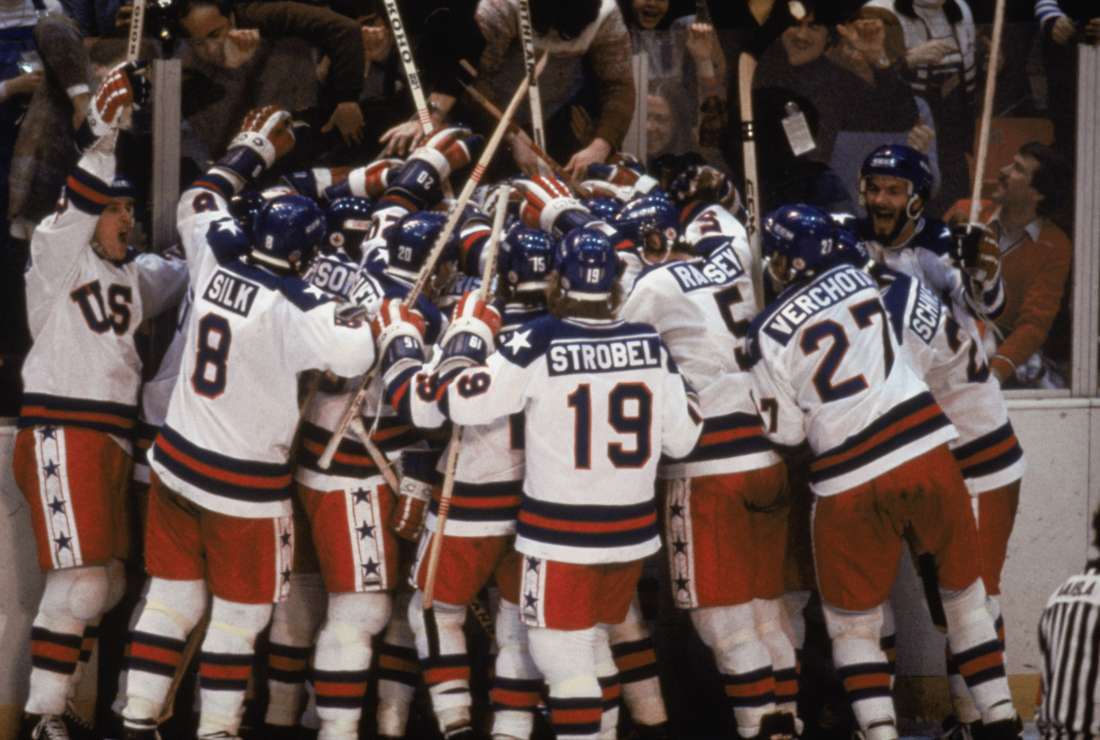“11 seconds, you got 10 seconds. The countdown going on right now! Morrow up to Silk, 5 seconds left in the game! Do you believe in miracles? Yes!”.
These words spoken by legendary broadcaster Al Michaels are forever engraved in the history of USA hockey. The call came in the closing seconds of what may be the greatest upset in the history of sports. The political ties made it much more than a hockey game. Known as the miracle on ice, the United States’ upset the USSR on the night of February 22nd, 1980. That game forever changed the image of USA hockey.
Even 38 years later it still doesn’t add up. How did a team of American college kids beat a team who lit up the NHL All-Stars 6-0? I mean, you’d think if anybody could beat the Soviet Red Army it’d be the NHL All-Stars. However even with the Eastern and Western conferences combined, it was still no contest. Known primarily for their intricate passing plays, the Soviets showed the world a whole new style of hockey.
Their domination only further enforced the communist propaganda of the USSR. The Red Army only lost one Olympic contest in the past 16 years, taking home the gold on all four occasions. The odds were completely stacked against the Americans, but their perseverance and determination embodied everything that we still stand for as a nation. This team really did serve as a catalyst for the entire country and it couldn’t have been done without the four rag-tag Boston boys.
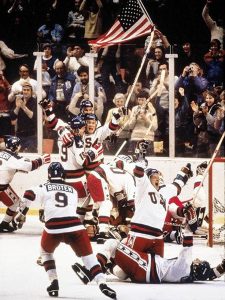
Dave Silk
Born in Scituate, Silk played high school hockey at Thayer Academy in Braintree prior to joining BU in 1976. His impact on the Terriers was noticed as he put up 65 points in just 34 games as a freshman, leading BU to their fourth consecutive ECAC title. His domination earned him the New England Rookie of the Year honors and it only continued throughout his collegiate career. Even despite another stellar season on the score sheet (27-31-58), Silk’s Sophomore year was highlighted with a National Championship victory over BU’s archrival BC Eagles.
This production was enough for the New York Rangers to take Silk in the 1978 amateur draft, although he did not sign with the team until after the Olympic games to preserve his amateur status for the tournament. He put up five points in the seven games at Lake Placid. From there the dynamic forward went straight to New Haven, Connecticut to begin his professional career in the AHL. After another brief stint in the “A” during the 1980-81 season, Silk was called up to New York. He finished his rookie season with 26 points through 59 games and solidified himself as an NHL player.
Silk eventually retired from the NHL in 1986 after having played for New York, Boston, Detroit, and Winnipeg. He put up solid numbers, finishing with 113 points in 249 NHL games. His career will forever be highlighted by his role in the miracle on ice.
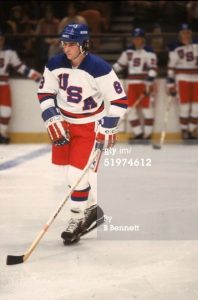
Jack O’ Callahan
The hard-hitting defenseman out of Charlestown attended Boston Latin High School prior to BU. Joining the Terriers in 1975, O’ Callahan played a vital role in BU’s three consecutive ECAC championships. He was about the average size for a defenseman but had a very physical style of play. O’Callahan was ruthless in his own zone and was always one to clear out the front of the net. The hard edge that he had to his game led to 283 penalty minutes over his four years at BU. However it definitely made his movie character an audience favorite. He missed the first two Olympic games with a knee injury, but suited up for the remaining five.
“OC” was drafted by Chicago after his sophomore year at BU. He began his professional career with the New Brunswick Hawks immediately after the miracle. After just one full season in the American League O’Callahan made his NHL debut in 1982. He was a reliable defenseman with Chicago and remained a physical presence on the Hawks until he was traded to New Jersey. He retired in 1989 after playing parts of two seasons with the Devils, finishing with a career stat line of 27-104-131 in 389 NHL games.
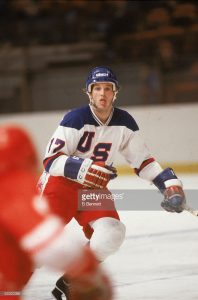
Jim Craig
Craig grew up in a North Easton house with three brothers and four sisters. He admitted that he started playing goalie because he wanted to play with his brothers but didn’t know the rules. He fell in love with it and got plenty of practice from his brothers and the other kids in the neighborhood. Craig starred at Oliver Ames High School in North Easton and began his BU career in 1976. During his freshman season his mother, who was a heavy smoker, was diagnosed of cancer. She passed away in 1977 right as his dad lost his job. This took a huge toll on the family of nine. Even with his struggling family Craig posted a 29-4-2 record through three seasons at BU and played big role in the 1978 National Championship win.
He was taken by Atlanta in the fourth round of the 1977 draft and signed immediately after the miracle in 1980. After playing four games in the tail end of the season Craig was traded to Boston for the 1980-81 season. He played in 23 games posting a 9-7-6 record and wouldn’t see the NHL again until the 1983-84 season. After thirty games in Minnesota his NHL career came to an end. He finished with a career record of 11-10-7 and a goals against of 3.78.
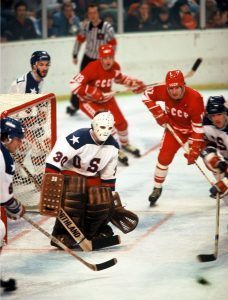
Mike Eruzione
The “Massachusetts Miracle Man” played for his hometown of Winthrop all throughout his youth and high school hockey days. He then played a post-grad year at Berwick Academy in Maine and joined the Terriers in 1973. He helped lead the Terriers to an ECAC championship title in each of his four years at BU, highlighted by a 64-point senior year. This was enough to get the attention of the WHA’s New England Whalers and he was taken in second round of the 1974 WHA draft. He never played in the WHA or the NHL. He spent two years playing semi-professionally, but didn’t want a prolonged NHL career. Despite negotiations with the New York Rangers, Eruzione felt that he had already reached his peak by scoring the miracle on ice clinching goal.
He hung up the skates at just 26 years old and worked as a color commentator. Eventually Eruzione returned to his hometown of Winthrop and coached his son’s youth team. He was also an assistant on the boys’ varsity team, and seems content with not going pro. It’s crazy that the guy who scored the biggest goal in the history of hockey never played in the NHL.
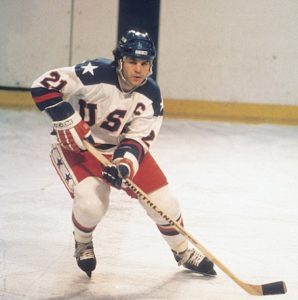
Cover image courtesy of mentalfloss.com
